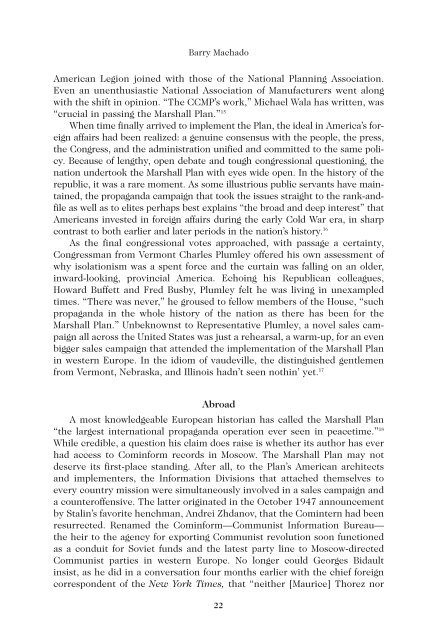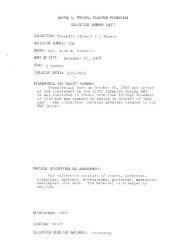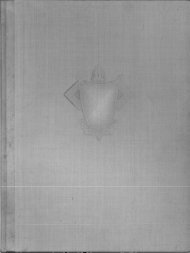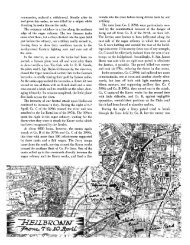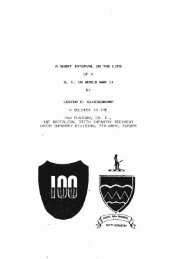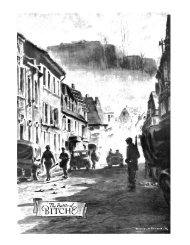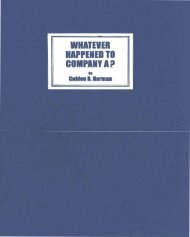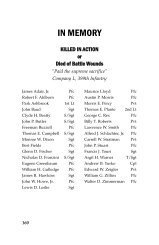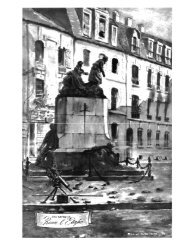Selling the Marshall Plan - The George C. Marshall Foundation
Selling the Marshall Plan - The George C. Marshall Foundation
Selling the Marshall Plan - The George C. Marshall Foundation
Create successful ePaper yourself
Turn your PDF publications into a flip-book with our unique Google optimized e-Paper software.
Barry Machado<br />
American Legion joined with those of <strong>the</strong> National <strong>Plan</strong>ning Association.<br />
Even an unenthusiastic National Association of Manufacturers went along<br />
with <strong>the</strong> shift in opinion. “<strong>The</strong> CCMP’s work,” Michael Wala has written, was<br />
“crucial in passing <strong>the</strong> <strong>Marshall</strong> <strong>Plan</strong>.” 15<br />
When time finally arrived to implement <strong>the</strong> <strong>Plan</strong>, <strong>the</strong> ideal in America’s foreign<br />
affairs had been realized: a genuine consensus with <strong>the</strong> people, <strong>the</strong> press,<br />
<strong>the</strong> Congress, and <strong>the</strong> administration unified and committed to <strong>the</strong> same policy.<br />
Because of lengthy, open debate and tough congressional questioning, <strong>the</strong><br />
nation undertook <strong>the</strong> <strong>Marshall</strong> <strong>Plan</strong> with eyes wide open. In <strong>the</strong> history of <strong>the</strong><br />
republic, it was a rare moment. As some illustrious public servants have maintained,<br />
<strong>the</strong> propaganda campaign that took <strong>the</strong> issues straight to <strong>the</strong> rank-andfile<br />
as well as to elites perhaps best explains “<strong>the</strong> broad and deep interest” that<br />
Americans invested in foreign affairs during <strong>the</strong> early Cold War era, in sharp<br />
contrast to both earlier and later periods in <strong>the</strong> nation’s history. 16<br />
As <strong>the</strong> final congressional votes approached, with passage a certainty,<br />
Congressman from Vermont Charles Plumley offered his own assessment of<br />
why isolationism was a spent force and <strong>the</strong> curtain was falling on an older,<br />
inward-looking, provincial America. Echoing his Republican colleagues,<br />
Howard Buffett and Fred Busby, Plumley felt he was living in unexampled<br />
times. “<strong>The</strong>re was never,” he groused to fellow members of <strong>the</strong> House, “such<br />
propaganda in <strong>the</strong> whole history of <strong>the</strong> nation as <strong>the</strong>re has been for <strong>the</strong><br />
<strong>Marshall</strong> <strong>Plan</strong>.” Unbeknownst to Representative Plumley, a novel sales campaign<br />
all across <strong>the</strong> United States was just a rehearsal, a warm-up, for an even<br />
bigger sales campaign that attended <strong>the</strong> implementation of <strong>the</strong> <strong>Marshall</strong> <strong>Plan</strong><br />
in western Europe. In <strong>the</strong> idiom of vaudeville, <strong>the</strong> distinguished gentlemen<br />
from Vermont, Nebraska, and Illinois hadn’t seen nothin’ yet. 17<br />
Abroad<br />
A most knowledgeable European historian has called <strong>the</strong> <strong>Marshall</strong> <strong>Plan</strong><br />
“<strong>the</strong> largest international propaganda operation ever seen in peacetime.” 18<br />
While credible, a question his claim does raise is whe<strong>the</strong>r its author has ever<br />
had access to Cominform records in Moscow. <strong>The</strong> <strong>Marshall</strong> <strong>Plan</strong> may not<br />
deserve its first-place standing. After all, to <strong>the</strong> <strong>Plan</strong>’s American architects<br />
and implementers, <strong>the</strong> Information Divisions that attached <strong>the</strong>mselves to<br />
every country mission were simultaneously involved in a sales campaign and<br />
a counteroffensive. <strong>The</strong> latter originated in <strong>the</strong> October 1947 announcement<br />
by Stalin’s favorite henchman, Andrei Zhdanov, that <strong>the</strong> Comintern had been<br />
resurrected. Renamed <strong>the</strong> Cominform—Communist Information Bureau—<br />
<strong>the</strong> heir to <strong>the</strong> agency for exporting Communist revolution soon functioned<br />
as a conduit for Soviet funds and <strong>the</strong> latest party line to Moscow-directed<br />
Communist parties in western Europe. No longer could <strong>George</strong>s Bidault<br />
insist, as he did in a conversation four months earlier with <strong>the</strong> chief foreign<br />
correspondent of <strong>the</strong> New York Times, that “nei<strong>the</strong>r [Maurice] Thorez nor<br />
22


